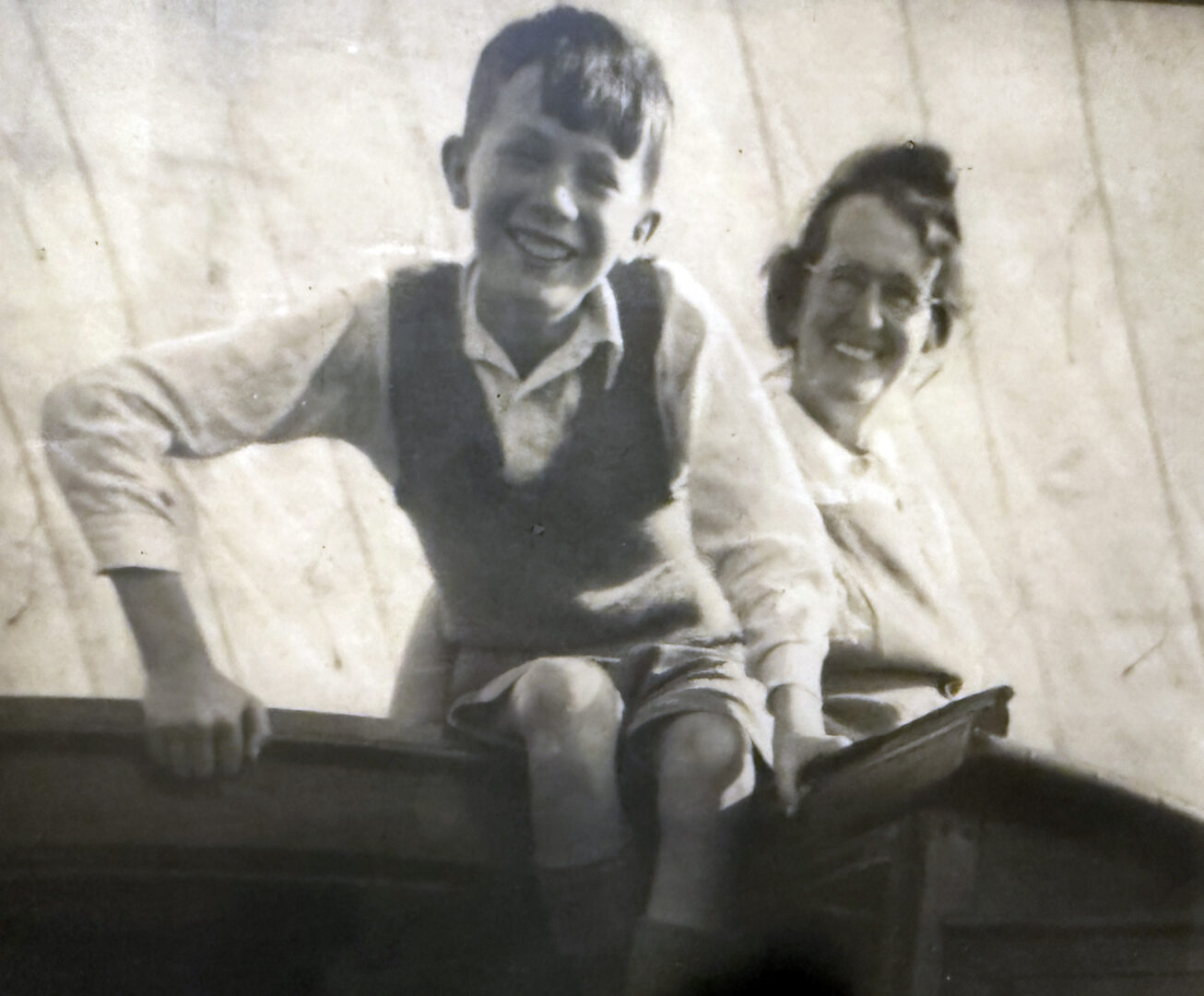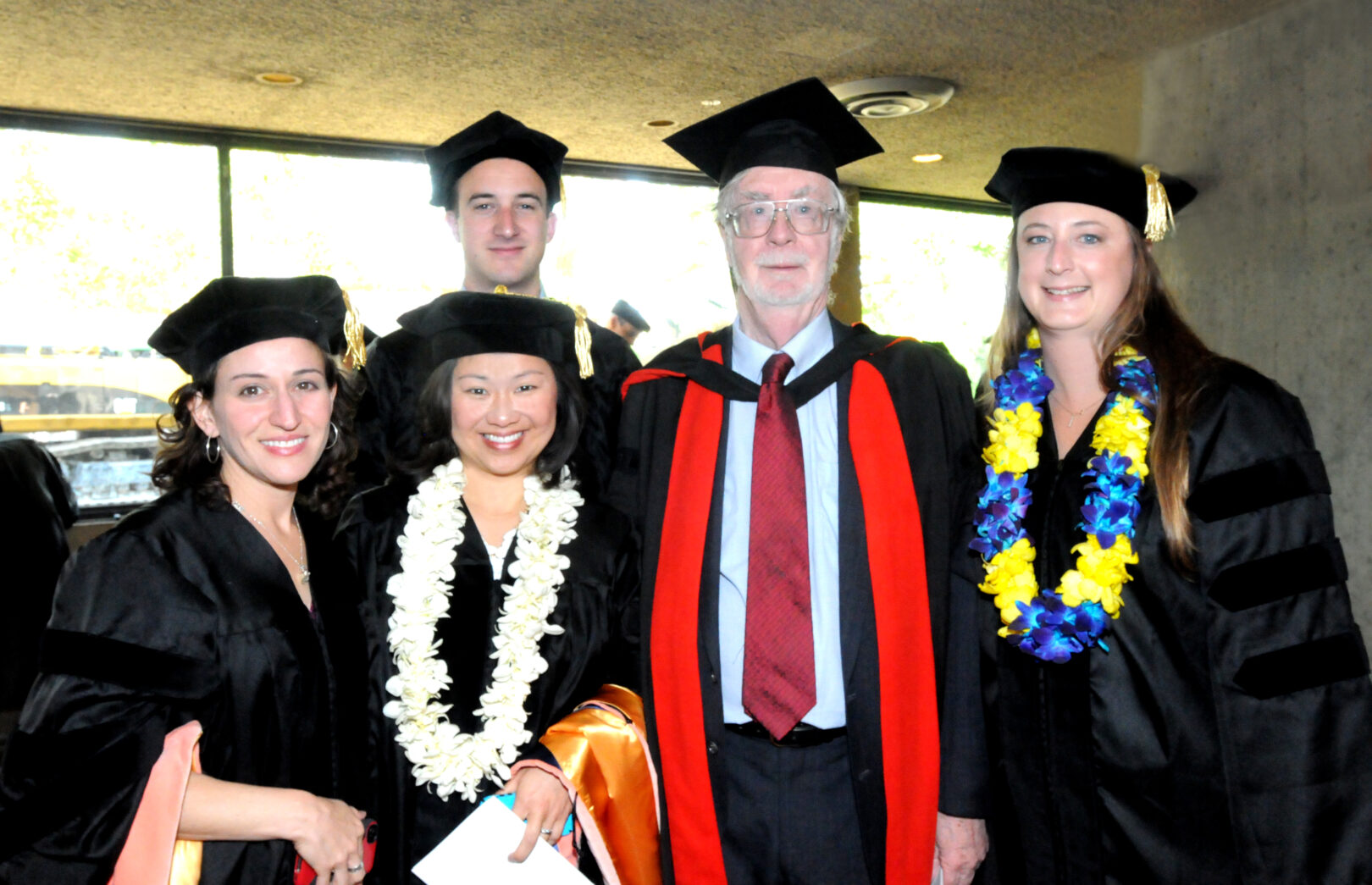Dr. Malcolm Potts, gutsy global changemaker for reproductive health and women’s rights, dies at 90
- 11 min. read ▪ Published
Dr. Malcolm Potts, a trailblazer in international family planning and women’s reproductive health, died in Berkeley, CA, on April 25, 2025. He was 90.
A University of Cambridge–trained obstetrician and reproductive scientist, Potts emerged in the 1960s as a leader in what was then a revolutionary movement for access to reliable contraception and safe abortion.
Long before he joined the faculty of UC Berkeley School of Public Health in 1992 as the inaugural Fred H. Bixby Endowed Chair in Population and Family Planning, Potts was widely recognized as a visionary, with a rare gift for using science to win opponents over to his mission to promote women’s health—and the right to self-determination—around the world.
Among his many achievements: Potts convinced a priest in Ethiopia to allow the use of contraception to save women’s lives; he performed vasectomies at a train station in India on men who feared going to a hospital; working with his late wife and collaborator, Dr. Martha Campbell, he led international efforts to ensure access to misoprostol to treat and prevent postpartum hemorrhage in many countries.
In 2009, Potts established UC Berkeley Public Health’s Bixby Center for Population, Health and Sustainability, an enduring institution that embodies his passion for research and for training the next generation of scholars.
“Malcolm was a pioneer whose life’s work transformed global reproductive health and human rights,” said Dr. Michael C. Lu, dean of the UC Berkeley School of Public Health.
“His bold vision was evident as early as 1969, when he famously told Reader’s Digest, ‘It would be a service to mankind if the pill were available in vending machines and cigarettes were placed on prescription.’”
“Here at home,” said Lu, “Malcolm never stopped fighting to expand access to reproductive health—most recently working to secure FDA approval for over-the-counter oral contraceptives.”
Dr. Julia Walsh, a senior research scientist at the Bixby Center and professor of community health sciences at BPH, who often collaborated with Potts, said his intense interest in women’s reproductive health was spurred by a family tragedy.
“He said he had a grandmother who died in childbirth,” Walsh said. “I’m sure that was very, very central.”
A medical epiphany led to life-long passion for safe access to contraception

Potts with his mother just after the end of World War II. Photograph provided by Potts’ family.
David Malcolm Potts was born on January 8, 1935, in Sunderland, England, to Ronald Windle Potts and Kathleen A. Cole. He was the youngest of three sons. The family initially lived near Newcastle, but in 1939, as war loomed, they relocated to Cambridge.
At age 11, he passed an entrance exam to the Perse School Cambridge, founded in 1615 to bring education to poor children. Potts later wrote in a private family history that passing that exam was the most important day of his young life.
“Had I failed, everything I have done since: an MD and a PhD, founder of some important non-governmental bodies, and now a co-founder of a pharma company, would have been impossible,” he wrote.
“Above all, I would not have been in a position to undertake what has become my life-long passion—to give women access to family planning and safe abortion.”
After completing his medical education, he worked as an obstetrician in a busy north London hospital. At the time, abortion was illegal.
“Almost without exception,” he wrote, “whenever I was on duty I had to deal with a case of incomplete abortion, that is, when a woman is pregnant but losing blood from the uterus.”
“In many cases it was impossible to determine whether I was dealing with a spontaneous abortion—a common event in early pregnancy—or an abortion that had been deliberately induced.”
An anesthesiologist who talked to patients as they were getting too sleepy to lie, told Potts that the vast majority had been induced. “It was my epiphany,” he wrote.
He became the medical spokesman for the Abortion Law Reform Association, which liberalized England’s abortion law in 1966. He also became medical director for the International Planned Parenthood Federation, which played a leading role in introducing uterine manual vacuum aspiration.
Since then, the procedure has become the preferred surgical method to terminate an unintended pregnancy of 12 weeks or less. More than one million MVA abortions are performed each year, the majority in Africa. Potts called his work developing and promoting MVA his proudest achievement. Working with physician Alan Guttmacher and Thai politician Mechai Viravaidiya, he organized the first community-based distribution of oral contraceptives and condoms in Thailand.
In his family history, Potts wrote that this project contributed to a decline in the total fertility rate in Thailand, from 7.4 in the 1960s to 1.5 by 2022.
“Without which,” he wrote, “Thailand is unlikely to have become the prosperous, democratic country it is today.”
Potts moved to the United States in 1978, where he served as president and chief executive of Family Health International. There, he led pioneering maternal mortality studies which helped start the worldwide Safe Mother Initiative. He also built the largest AIDS prevention program outside of the World Health Organization and initiated the first HIV prevention programs in Africa, with sex workers. Family Health International became the first American institution to receive large scale federal support for the control of AIDS.
A knack with metaphors in defense of facts

Potts with a group of UC Berkeley School of Public Health doctoral students.
After joining the UC Berkeley faculty, Potts quickly became a popular professor. Nap Hosang, public health entrepreneur and former professor of Maternal and Child Health at UC Berkeley School of Public Health, helped recruit Potts for the post and worked with him to develop courses on family planning and reproductive health. Hosang said Potts’ guiding principle was to stick with science.
“He didn’t make statements that are unverifiable by facts,” Hosang said. “He wouldn’t take a position on religion. He would say, ‘If you define your objective as being one in which you want women to not suffer some of the injustices that they have had for thousands of years, then there are two things you must afford women: free access to education and free access to determine how many children they want.”
Hosang also praised Potts for his clever use of metaphor, and colorful ways he expressed his points.
One well-known story was Potts’ appearance on the David Frost show, which aired from 1969 to 1972, to discuss oral contraceptives. He was featured with another physician, who insisted that abortions were so dangerous he would only prescribe them to prostitutes.
Potts was undaunted. He stepped up to Mr. Frost’s table, and spilled out a 1.5 pound sack of rice. Then he separated two grains out of the 100,000 or so grains.
He carefully put two grains between his finger and thumb, and held them in front of the camera.
“I said, ‘This is the risk of death when you take the pill,'” he recalled in his family history. “Then I removed 27 grains, counting them out one by one, and said, ‘This is the number dying from unintended pregnancy.”’
His two piles of rice on a black coffee table, watched by millions of viewers, he wrote, had won the argument.
Potts was a prolific writer, whose ten-plus books and 300 scientific papers covered the gamut from Ever since Adam and Eve: The Evolution of Human Sexuality, with Roger Short, to Queen Victoria’s Gene, written with his brother, Prof. William Potts.
Dr. Stef Bertozzi, former UC Berkeley School of Public Health dean and professor of health policy and management, called Potts one of the most impactful people of the last 100 years in making contraceptives available to women all over the world, and helping to ensure that both the products and the policies are aligned.
He credits Pott’s success to a combination of fearlessness and bullheadedness.
“Malcolm would take the bit between his teeth and just drive,” Bertozzi said. “He wouldn’t take no for an answer…. He was relentless when he believed something needed to be addressed. He fought for what he believed in like few people I’ve ever known.”
A push to empower women worldwide
While on the UC Berkeley faculty, Potts co-founded an organization now known as OASIS (Organizing to Advance Solutions in the Sahel), devoted to educating adolescent girls, reducing maternal mortality, and expanding voluntary family planning in the Sahel region of Africa.
Alisha Graves, a co-founder of OASIS, travelled around the world for six years, meeting with ministries of health, OB-GYNs and midwives, and working to improve access to misoprostol.
“He always wanted to focus on the poorest parts of the world, and women who are most at risk,” Graves said. “The Sahel has rapid population growth and high malnutrition; low literacy.”
Together with Daniel Perlman and Habiba Mohamed, Malcolm started a project out of the Bixby Center, which Malcolm chaired, called Safe Spaces in Northern Nigeria. These mentored girls clubs reinforce math and literacy, but also introduce life skills like health, hygiene and communication skills to negotiate staying in school.
Malcolm was astounded by the results, given what he knew of this context, Graves said.
In recent years, Potts co-founded Cadence Health, Inc., a company dedicated to making oral contraceptives available over the counter in the United States.
Potts was married four times. His first marriage, to Dera Joyce Cook, ended in divorce, as did his second marriage, to Dr. Caroline Deys. Potts’ third wife, Marcia Jaffe Potts, died in 1993.
His final marriage was to Dr. Martha Madison Campbell, who predeceased him in 2022.
Potts is survived by four children, three stepchildren, seven grandchildren, and four great-grandchildren.
In a memo to BPH staff, Dean Lu asked the community to join him, “in reflecting, with gratitude, on all that he gave to our community, our field and our world.”
Plans for a memorial service will be forthcoming.
Memorial donations may be made to the School of Public Health Fund in memory of Malcolm Potts. Please make your check payable to the UC Berkeley Foundation and mail to: UC Berkeley Foundation, Attention: Gift Services, 1995 University Ave, Ste 400, Berkeley, CA 94704. Please write “School of Public Health Fund, FN420000” on your check, and note it is in memory of Malcolm Potts. Or, you may visit give.berkeley.edu/publichealth and follow the prompts to indicate it is a memorial gift.